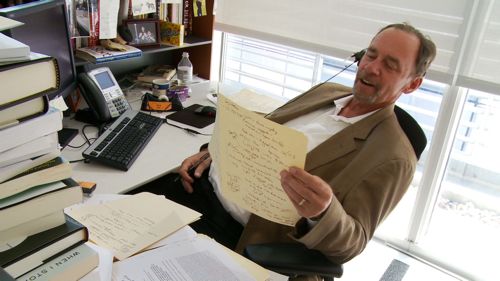
Jim Romenesko
Something very strange and unjust happened yesterday in the little world of media criticism: Jim Romenesko, who’s been blogging about media news since the late 1990s, and who was just several weeks away from retirement, was accused by his employer, the Poynter Institute, of plagiarism-like offenses. Romenesko resigned.
If you read between the lines, it seems that this was not a typical case of resigning rather than being fired. Rather, I think he resigned rather than continue to work for people who claim they didn’t understand his methodology until this week — a claim that, frankly, I find pretty dubious.
What’s important to keep in mind about Romenesko is that his media-news site functioned as an aggregator, not as a source of original content. I’ve been reading him almost from the start, when he began writing a blog (we didn’t call them blogs back then) called MediaGossip.com while holding down a job at the St. Paul Pioneer Press. I never really considered what he did to be “writing.” Rather, he found interesting stuff, copied, aggregated and linked out. It was one-stop shopping for people who wanted to know what was going on in journalism.
Jeremy Peters of the New York Times, who labels yesterday’s events “bizarre,” observes that Romenesko was called to task for “his failure to use quotation marks when summarizing articles” even though he “never claimed credit for [those summaries] as his original work.” That’s exactly right. I always considered Romenesko to be among the most ethical and transparent of journalists, and I still do.
The details, from Poynter’s perspective, are laid out in this post (link now fixed) by Julie Moos, the director of Poynter Online. I found her post to be thoughtful and serious; she doesn’t deserve the abuse she’s taking over this. Nevertheless, I believe she and other Poynter executives made a serious error of judgment in writing about Romenesko’s methodology as though it raised some sort of ethical issue. It didn’t. It appears that Poynter acted rashly after hearing from Erika Fry, an assistant editor at the Columbia Journalism Review, who had discovered that Romenesko was indifferent about using quotation marks when excerpting material he was linking to.
You can read the example Moos offers for yourself. Here’s another, typical example that I found this morning, from April 23, 2010. I offer it in full:
Why NPR wanted to overturn the law banning animal cruelty images
NPR.org
NPR believes that the law, as it stood, could have been misused to criminalize speech about the use and abuse of animals. In NPR’s view, says a lawyer for the network, “the statute could allow the federal government and courts presiding over cases brought under the law, to substitute their own news judgment in place of the judgment of an NPR editor.”
The headline is linked to a column by Alicia Shepard, then-ombudsman for NPR. When you click through to her column, you find that the first sentence of Romenesko’s summary is actually something Shepard wrote. Is that deceptive? We know we are reading a summary of an NPR item, and we are invited to click to read the whole thing. It certainly doesn’t look to me like Romenesko was trying to deceive anyone.
I think Moos’ claim that Poynter didn’t know how Romenesko went about his business until this week is problematic. Those of us who have read his blog over the years have always known. Especially in the early years, he updated maniacally. You could email him a tip, and, if it was hot enough for him, he’d have it up within minutes. Copy and link. Copy and link. That’s what he did. And he was (and is) exceptionally skilled at finding the heart of your story, which of course led to more clicks for your site.
Let me give the folks at Poynter this much. Early on in their relationship with Romenesko, they could have sat down with him and told him to be more careful about using quotation marks — that material being quoted directly had to be labeled as such, even if he was not deceiving anyone. Just from the point of view of craft, I think the blog would have been better if he’d done that. But to hang him out to dry now, and to claim they didn’t know, is cold.
Erik Wemple has a must-read post on Romenesko at WashingtonPost.com. He reinforces my sense that Romenesko’s offense, such as it was, was not completely inconsequential. But I wish he had dealt with the absurdity of Poynter now claiming it never knew what its most valuable employee was up to.
Romenesko’s resignation prompted a firestorm of criticism, nearly all of it directed at Poynter, on Twitter (some from me) and on the Poynter website. A lot of it was from media critics. So let me acknowledge that we all have a conflict of interest. Especially during my years as the Boston Phoenix’s media columnist, but even today, I have shamelessly plugged my work in emails to him, asking for links and recognition. I benefitted hugely from Romenesko’s attention. It was because of his blog that a local media critic like me was able to develop a small national following. So yes, I suppose I am defending him as vociferously as I am out of a sense of loyalty and gratitude. But I’ll repeat: Though I think he could have been more careful about quoting, he did nothing unethical, and was completely transparent and open about what he was doing. All you had to do was click and check his work.
What will be the fallout for Poynter? It’s hard to say. Romenesko was leaving in a few weeks anyway to start a new, independent blog, JimRomenekso.com. But I’m pretty sure he was expecting to contribute to Poynter from time to time. And he has said his new blog would be devoted to longer, reported items. But what if he’s now angry enough to use his new blog to compete directly with Poynter? That could be interesting.
Some years ago, I recall reading a story about how brilliant Poynter had been to sign up Romenesko and make him the centerpiece of its online efforts. It was mainly because of him that Poynter Online became the first stop for people interested in journalism, leapfrogging such venerable outlets as the CJR and the American Journalism Association.
If you poke around Compete.com, which tracks Web traffic, you’ll find that Poynter.org has an exponentially larger audience than other journalism sites, including some really good ones such as the Project for Excellence in Journalism’s Journalism.org. I don’t consider Compete’s numbers to be all that reliable, but I think they’re a good guide for getting a rough idea of who’s more popular than whom.
Which is to say that the Romenesko matter could be devastating to Poynter depending on how it plays out.
 Congress is coming after your Internet. Two proposals wafting their way through the House and the Senate would destroy the Internet as we know it, forcing some websites to shut down and others never to launch in order to avoid onerous penalties for copyright infringement.
Congress is coming after your Internet. Two proposals wafting their way through the House and the Senate would destroy the Internet as we know it, forcing some websites to shut down and others never to launch in order to avoid onerous penalties for copyright infringement.




Violence, art and the media’s responsibilities
By Dan Kennedy
On November 7, 2011
In Media
Part of the exhibit “Anonymous Boston,” which documents the lives of young murder victims and how the media covered their deaths, the discussion will be held at the Fourth Wall Project, near Kenmore Square, at 132 Brookline Ave. The panel is titled “If It Bleeds, It Leads: The Role of Media in Urban Violence.” I will have the honor of moderating.
The exhibit is the subject of this week’s cover story in the Boston Phoenix by Chris Faraone. As you will see, the families of murder victims say the loss of their children is often compounded by sensational, inaccurate media coverage and by hateful online comments.
The Boston Herald is singled out by several people as a particularly egregious offender. Morever, Joanna Marinova-Jones, the community activist who has overseen the exhibit, is in the midst of a libel suit against the Herald. Despite those facts (or maybe because of them), I’m hoping the Herald will accept our invitation for what is intended as a substantive, civil conversation.
Participants who have already confirmed include Boston Globe city editor Steve Smith, Bay State Banner executive editor Howard Manly, WGBH Radio (89.7 FM) senior investigative reporter Phillip Martin, El Planeta managing editor Marcela Garcia, pioneering African-American television reporter Sarah Ann Shaw and Faraone.
The event will take place from 6 to 8 p.m., and is free and open to the public.